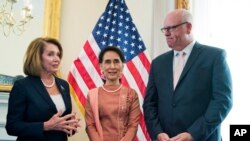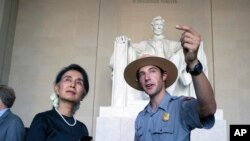U.S. lawmakers met Thursday with Myanmar’s de facto leader, Aung San Suu Kyi, and expressed mixed reactions to President Barack Obama’s intention to lift economic sanctions on the country formerly known as Burma.
Aung San Suu Kyi held separate talks with prominent House and Senate members of both parties at the Capitol. Sanctions played prominently in the discussions, according to several lawmakers who spoke with VOA afterward.
“The message was clear, that Burma’s a different country today than it was when those sanctions were imposed,” said Senator Ben Cardin of Maryland, the top Democrat on the Foreign Relations Committee.
Cardin stressed that America’s attention is still needed in Myanmar, but that U.S. influence can be exerted more with carrots than sticks.
“There is a continued role for the United States, but it’s going to be in a much more positive way,” he said.
“The president acted unilaterally [lifting sanctions] in a way that was unfortunate,” said Republican Cory Gardner, chairman of the Subcommittee on East Asia and Pacific. “There are a number of concerns with military involvement and crony business operatives participating in illicit activities that warrant continued sanctioning."
“We should make sure that the military doesn’t have access to ways to enrich itself, as it has been for decades, and to make sure that we continue to provide leverage against the bad actors who have created so much difficulty for the people of Burma,” Gardner added.
View the photo gallery:
At the White House on Wednesday, Obama cited Myanmar's "remarkable social and political transformation" as he signaled his administration’s readiness to lift those sanctions that can be scrapped without congressional authorization.
Earlier, the president sent a letter to Congress saying the administration is moving to restore trade benefits to Myanmar that were suspended more than two decades ago because of human rights abuses.
The announcement contrasted sharply with a statement issued by the chairman of the Senate Foreign Relations Committee, Republican Bob Corker, who met with Aung San Suu Kyi earlier in the day at Vice President Joe Biden’s residence.
“While we certainly appreciate the work Aung San Suu Kyi has done to ensure a democratic transition in Burma, I am somewhat appalled by her dismissive reaction to concerns I raised this morning about the problem of human trafficking in her country,” said Corker.
“After witnessing her lack of regard for Burma’s dismal track record on this issue, I plan to pay very close attention to her government’s efforts to prevent innocent human beings from being trafficked and sold into forced labor and sex slavery," Corker said.
Corker has been a leading voice in the Senate against global human trafficking.
“Senator Corker and I talked about his conversation [with Aung San Suu Kyi],” Cardin said. “I followed up on it during our meeting [with her at the Capitol] and got a much more responsive reply in regards to what their [Myanmar’s] actions are going to be dealing with human trafficking. I was pleased to see that there was a detailed response and the issue was taken very seriously.”
Sitting next to Obama Wednesday, Aung San Suu Kyi urged a lifting of U.S. sanctions, saying that “unity also needs prosperity, because people, when they have to fight over limited resources, forget that standing together is important."
She pleaded for people to visit and invest in the country, saying, “I expect businessmen to come to our country to make profits.”
Aung San Suu Kyi said she expects Myanmar’s legislature to pass a new investment law she hopes will be very attractive to countries around the world.
“She’s made remarkable progress,” said Senate Minority Leader Harry Reid, a Nevada Democrat. “There’s a long ways [to go].”
“It’s been truly remarkable to see the changes that have taken hold in Burma in recent years, changes that once seemed literally unattainable,” said Senate Majority Leader Mitch McConnell, a Kentucky Republican, in floor remarks before meeting with Aung San Suu Kyi.
McConnell said challenges remain, however, “like addressing much-needed constitutional reform and the military’s disproportionate power in parliament, like ending decades-long conflicts and peaceful reconciliation among ethnic groups, like encouraging economic development.”
This was Aung San Suu Kyi's first visit to the U.S. as state counselor and foreign minister — a position she assumed after her party's decisive win in last November's elections. The country's military era constitution bars her from holding the title of president because her late husband and children are foreign citizens.
Aung San Suu Kyi spent more than 20 years under house arrest in the country. Her meeting with Obama in the Oval Office is viewed as another clear indication that she is Myanmar’s de facto civilian leader.
Over the past couple of decades, the White House and Congress have maintained a long list of sanctions on Myanmar, including restrictions on jade and gemstones, and also on businesses linked to the sales of arms and illegal drugs. Obama eased some of those sanctions in 2013.
VOA White House correspondent Cindy Saine contributed to this report







